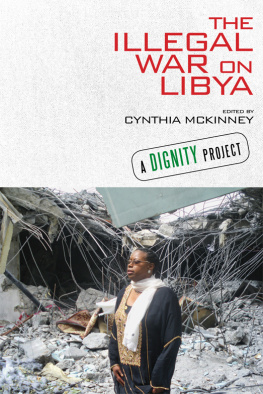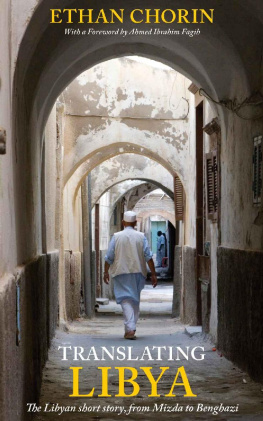
Women in the Modern History of Libya
Women in the Modern History of Libya features histories of Libyan women exploring the diversity of cultures, languages and memories of Libya from the age of the Empires to the present.
The chapters explore a series of institutional and private archives inside and outside Libya, illuminating historical trajectories marginalised by colonialism, nationalism and identity politics. They provide engaging and critical exploration of the archives of the Ottoman cities, of the colonial forces of Italy, Britain and the US, and of the Libyan resistance the Mawsat riwyt al-jihd (Oral Narratives of the Jihd) collection at the Libyan Studies Center of Tripoli as well as of the private records in the homes of Jewish and Amazigh Libyans across the world. Developing the tools of womens and gender studies and engaging with the multiple languages of Libya, contributors raise a series of critical questions on the writing of history and on the representation of Libyan people in the past and the present.
Illuminating the sheer diversity of histories, memories and languages of Libya, Women in the Modern History of Libya will be of great interest to scholars of North Africa; womens and gender history; memory in history; cultural studies; and colonialism. The chapters were originally published as a special issue of the Journal of North African Studies.
Barbara Spadaro is Lecturer in Italian History and Culture at the University of Liverpool, UK. Her principal areas of research are the history of Italians from North Africa, colonial and postcolonial migration and transcultural memory. She has published articles and a monograph on the history of women in the Italian empire, ideas of Italian whiteness and the Jewish diaspora from Libya.
Katrina Yeaw is Assistant Professor of History at the University of Arkansas at Little Rock, USA. Her research interests include gender, race, colonialism, violence, memory, law, resistance and collaboration, and colonial and post- colonial literature.
First published 2020
by Routledge
2 Park Square, Milton Park, Abingdon, Oxon, OX14 4RN
and by Routledge
52 Vanderbilt Avenue, New York, NY 10017
Routledge is an imprint of the Taylor & Francis Group, an informa business
2020 Taylor & Francis
All rights reserved. No part of this book may be reprinted or reproduced or utilised in any form or by any electronic, mechanical, or other means, now known or hereafter invented, including photocopying and recording, or in any information storage or retrieval system, without permission in writing from the publishers.
Trademark notice: Product or corporate names may be trademarks or registered trademarks, and are used only for identification and explanation without intent to infringe.
British Library Cataloguing in Publication Data
A catalogue record for this book is available from the British Library
ISBN13: 978-0-367-89424-5
Typeset in Myriad Pro
by Newgen Publishing UK
Publishers Note
The publisher accepts responsibility for any inconsistencies that may have arisen during the conversion of this book from journal articles to book chapters, namely the inclusion of journal terminology.
Disclaimer
Every effort has been made to contact copyright holders for their permission to reprint material in this book. The publishers would be grateful to hear from any copyright holder who is not here acknowledged and will undertake to rectify any errors or omissions in future editions of this book.
Contents
Barbara Spadaro and Katrina Yeaw
Rachel Simon
Nora Lafi
Katrina Yeaw
Barbara Spadaro
Leila Tayeb
Guide
The chapters in this book were originally published in the Journal of North African Studies, volume 23, issue 5 (December 2018). When citing this material, please use the original page numbering for each article, as follows:
Introduction
- Gender and transnational histories of Libya
- Barbara Spadaro and Katrina Yeaw
- Journal of North African Studies, volume 23, issue 5 (December 2018), pp. 745748
Chapter 1
- Centre and periphery: variations in gendered space among Libyan Jews in the late Ottoman period
- Rachel Simon
- Journal of North African Studies, volume 23, issue 5 (December 2018), pp. 749767
Chapter 2
- Finding women and gender in the sources: toward a historical anthropology of Ottoman Tripoli
- Nora Lafi
- Journal of North African Studies, volume 23, issue 5 (December 2018), pp. 768790
Chapter 3
- Gender, violence and resistance under Italian rule in Cyrenaica, 19231934
- Katrina Yeaw
- Journal of North African Studies, volume 23, issue 5 (December 2018), pp. 791810
Chapter 4
- Remembering the Italian Jewish homes of Libya: gender and transcultural memory (19672013)
- Barbara Spadaro
- Journal of North African Studies, volume 23, issue 5 (December 2018), pp. 811833
Chapter 5
- Our star: Amazigh music and the production of intimacy in 2011 Libya
- Leila Tayeb
- Journal of North African Studies, volume 23, issue 5 (December 2018), pp. 834850
For any permission-related enquiries please visit: www.tandfonline.com/page/help/permissions
Nora Lafi is a Postdoctoral Researcher at Leibniz-Zentrum Moderner Orient, Germany.
Rachel Simon is Head of the Middle Eastern Approvals Section at Princeton University Library, USA.
Barbara Spadaro is Lecturer in Italian History and Culture at the University of Liverpool, UK.
Leila Tayeb is Stanford H. Taylor Postdoctoral Associate in Music and Islam in the Contemporary World in the Department of Music at Cornell University, USA.
Katrina Yeaw is Assistant Professor of History at the University of Arkansas at Little Rock, USA.
Barbara Spadaro and Katrina Yeaw
This series of articles focuses on Libya to investigate how individual and collective identities are imagined, experienced, and narrated in a mobile and interconnected world. Drawing from original and unexplored sources in seven different languages, our case studies illuminate subjects and circuits long neglected from historiography, and yet crucial for the understanding of the transnational and transcultural memory of Libya. Our critical engagement with ways in which histories of Libya have been materialised, colonised, regimented and forgotten reflects a wider shift across the academic discipline of History.
Historians who works on the entangled social and cultural histories of the Middle East, North Africa and the Mediterranean are living an important historiographical moment, in which the major categories, historical narratives, and key assumption within the field are undergoing radical changes (Bashkin , 577).
Stretching from the late Ottoman period to the present, our case studies highlight subjects and sites of the transnational, diasporic and multilingual history of Libya. Our perspective engages with the power dynamics that casted early historical narratives and that keep shaping ideas of history and belonging. Our investigation begins with the mid-nineteenth century, exploring the moment of the geopolitical construction of Libya via imperial and Eurocentric categories that have been translated, and contested by scholars and historical subjects over time. It then moves on to the colonial period, which witnessed the shattering of existing forms of subjectivity and the construction of new understandings of gender under Italian rule. Finally, it addresses the postcolonial era and takes up recent developments in Libya since the upheaval of the 2010 uprising from North Africa.









